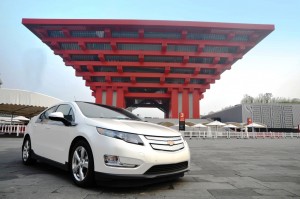
A Chevy Volt at the Shanghai Expo. While GM is accused of dumping, new Chinese rules will likely restrict Volt's appeal in that market.
U.S. automakers are receiving unfair subsidies that amount to illegally dumping cars on the Chinese market, Beijing regulators have ruled.
Chinese authorities have decided they will not levy penalties against the American makers cited by the complaint – ostensibly to avoid triggering a new trade dispute between the two countries. But the timing of the action raises concerns in that American makers have been sounding alarm over new rules they feel might impact their ability to market products in China by unfairly protecting domestic carmakers and suppliers.
“China’s domestic car industry … has suffered substantial damage,” said a statement from China’s Commerce Ministry, following the completion of an investigation that began in November 2009.
The investigation was launched on behalf of Chinese domestic automakers who complained about U.S. imports – which tripled in value to $3.4 billion between 2009 and 2010.
“After an investigation, the Commerce Ministry’s final decision is that U.S. firms that make sedans and sports utility vehicles of 2.5 liters and bigger engaged in dumping and were given subsidies,” the Ministry ruled.
For now, at least, the Ministry said it would not issue either fines or countervailing duties, though further details will be released later.
U.S. officials meanwhile raised the possibility that the methods used to measure the alleged subsidies and determine whether dumping had occurred – as defined as selling products at unfairly low prices. The officials questioned whether the process used by Beijing complied with policies set by the World Trade Organization, or WTO used to determine dumping.
“We are very disappointed,” said Carol Guthrie, a spokeswoman for the U.S. Trade Representative’s office, “even though it appears that such duties will not be imposed immediately,”
“The United States is closely reviewing the final determinations in these investigations, in particular their compliance with WTO rules,” Guthrie told Reuters news service.
If the procedures didn’t comply the U.S. could ask the WTO to reject China’s ruling.
The timing of the Commerce Ministry’s decision appears to be anything but coincidental, coming just two days before the opening of the annual Strategic and Economic Dialogue between the two countries. A key goal is to assess issues related to trade. Last year, bilateral trade between the two countries totaled $456.8 billion, of which only $91.9 was for goods shipped from the U.S. to China – though that latter figure reflected a one-year 31.9% increase.
China is expected to take an unusually hard stance about U.S. complaints, a position bolstered by not only its importance as an American supply source but also because of its vast holdings in U.S. debt.
American officials, including Secretary of State Hillary Clinton are expected to still press China on a broad range of issues, including rules that appear to be written specifically to assist Chinese automakers.
One of those measures means that General Motors’ new Chevy Volt plug-in hybrid will not qualify for tax credits available to those buying domestically-made battery cars. That’s a potentially huge setback because Chinese regulators are pressing hard to build a market for electric vehicles.

Oh really? How many factories and how much production are American-based corporations responsible for on Chinese soil? And how many products do the Chinese dump on us every year? Yes, we owe a slew of money to the Chinese because of the debt. But it is also true that the Chinese would find it very difficult to operate their “new economy” without U.S. support, and the U.S. quickly needs to bring to light the Chinese dumping practices here in the U.S. From the December 10, 2010: “To absolutely no one’s surprise, the World Trade Organization released a report this week concluding that China has been the top target of anti-dumping investigations in the first half of 2010.
In the first six months of the year, China was the target of a total of 23 anti-dumping investigations, according to the WTO’s report.
That, however, is down from the 33 investigations launched against Chinese products in the first half of 2009.” The main target of U.S. complaints: aluminum extrusions.
There’s no question that the Chinese anti-dumping inquiry was politically motivated. It gives them SOMEthing to counter with when the U.S. lays out all its concerns at the upcoming trade meeting. And temporarily waiving fines gives them a trump card to wave in the future as they could yet reverse course.
Sadly, each year the U.S. has bowed to China to keep the flow of cheap (often poorly-made) consumer goods flowing onto Wal-Mart shelves only has allowed the Chinese to gain further leverage. It may be next to impossible to achieve any real breakthroughs going forward.
Paul A. Eisenstein
Publisher, TheDetroitBureau.com